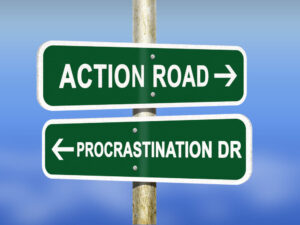
I will be the first to admit that procrastination is one of my worst vices. As a student, I would put off big assignments until the last minute, intensifying the stress and workload. Even now, I put off projects and delay difficult decisions until they have to be made. Although in most cases my procrastination has been a negative trait, there are times it brought unexpected benefits when applied to my finances. For example, I’ve learned that procrastination can save you money. Here’s how you can turn your bad habits into good ones that help your budget.
5 Ways Procrastination Can Save You Money
Procrastination doesn’t always have to be a bad thing. Here are a few ways it can help you save.
1. It gives you time to change your mind.
Every sales position I ever had reinforced one key tactic: seal the deal before they walk out the door. If the customer leaves, chances are they won’t be coming back. That’s because retailers depend on people making impulsive decisions and buying things they didn’t intend to purchase. Just look around you the next time you’re in a store and you’ll see the bombardment of advertisements. However, when I remove myself from the high-pressure sales environment, I make better financial choices.
Walking away gives you more time to consider the purchase and to change your mind. For me, I determine whether it is something that I really need or just want at that moment. When I remove emotions from the decision and look at the practicality of it, 9 times out of 10 I choose to save my money. I’ve learned I can easily talk myself out of unnecessary purchases and save money by sleeping on it.
2. It prevents buying things on impulse.
In that same line of thought, procrastinating can help you regain control of your finances and prevent you from buying on impulse. So, if you have trouble controlling your spending habits, enforcing a cooling-off period can help teach you some self-discipline.
In my case, impulse buying was a negative behavior that had worse financial consequences. I found myself with thousands of dollars in credit card debt because I didn’t keep track of my monthly spending. So, teaching myself some impulse control by procrastinating on purchases kept me from wasting money on things I didn’t need.
3. You could find a better deal.
Taking time to consider your decisions also allows you to comparison shop. Shopping around can help you find a lower price from other retailers. Or, if you are looking for an even deeper discount, you can browse low-priced second-hand items through local marketplaces. Sometimes having patience really pays off.
I typically plan my large purchases around holiday sales events to find the best discounts. With more companies offering free shipping and extended Black Friday deals, you can get items for a fraction of the cost. Last fall, my computer completely crashed. I made do with an old laptop from college until stores announced their computer specials a few weeks later. Since I put it off, I saved over $250 on a brand new laptop.
4. You could find a better product.
Another way that procrastination can save you money is when you find something better than what you initially wanted. Going back to my computer purchase, putting it off let me explore other products and compare all the deals.
In the end, I found a product that I hadn’t even known was available. Although it was normally out of my price range, the holiday sales made it affordable. Not only was it deeply discounted, but it was much better suited for my professional needs.
Waiting for a better deal also means that I can invest in higher-quality products. Not only will they last longer, but also save me more in the long run.
5. There is less risk of buyer’s remorse.
One trap that I still fall victim to is continuing to comparison shop after I’ve bought something. This often leads to severe buyer’s remorse. I would get so upset thinking about missing out on the savings or feel guilty about how much I had spent.
Instead of buying things right away, procrastinating has helped me avoid buyer’s remorse and take advantage of more discounts. In addition to saving money, I was also more confident with my purchases. Knowing that I saved money on quality items justifies more expensive purchases in my mind. I can sleep well knowing that even though I paid a bit more, I have something that will withstand the test of time.
Changing Habits for the Long-Term
Several studies have been conducted that show how procrastination can have devastating impacts on your finances. However, when you focus it specifically on your spending habits, you may discover that procrastination can actually save you money. Once I started implementing strict rules to gain some self-discipline, I saw many positive impacts in my life. Once I changed the behavior, my entire life also began to change with it.
Better yet, when I saw progress, it motivated me even further to stay on track and strive for my financial goals. What started as a way to curb my spending turned into a different way of viewing the world. The patience I practice with myself floods over into every aspect of my life.
And, it helps me remember what matters most by realizing the difference between immediate needs and wants. I find I’m generally happier now and realize that I don’t have many needs or waste money on unnecessary things. This is an important skill to have when you are living on a limited budget. But, in the greater scheme of things, it’s an important lesson that will ultimately lead to greater satisfaction in life.
Read More
- A Life Without Debt: Procrastination Is The Enemy
- How Managing Your Time & Money Is Important For Mental Health
- The Ultimate Guide to Buying Online_ How to Shop Smarter and Save Money
Come back to what you love! Dollardig.com is the most reliable cash-back site on the web. Just sign up, click, shop, and get full cashback!

Jenny Smedra is an avid world traveler, ESL teacher, former archaeologist, and freelance writer. Choosing a life abroad had strengthened her commitment to finding ways to bring people together across language and cultural barriers. While most of her time is dedicated to either working with children, she also enjoys good friends, good food, and new adventures.






Comments